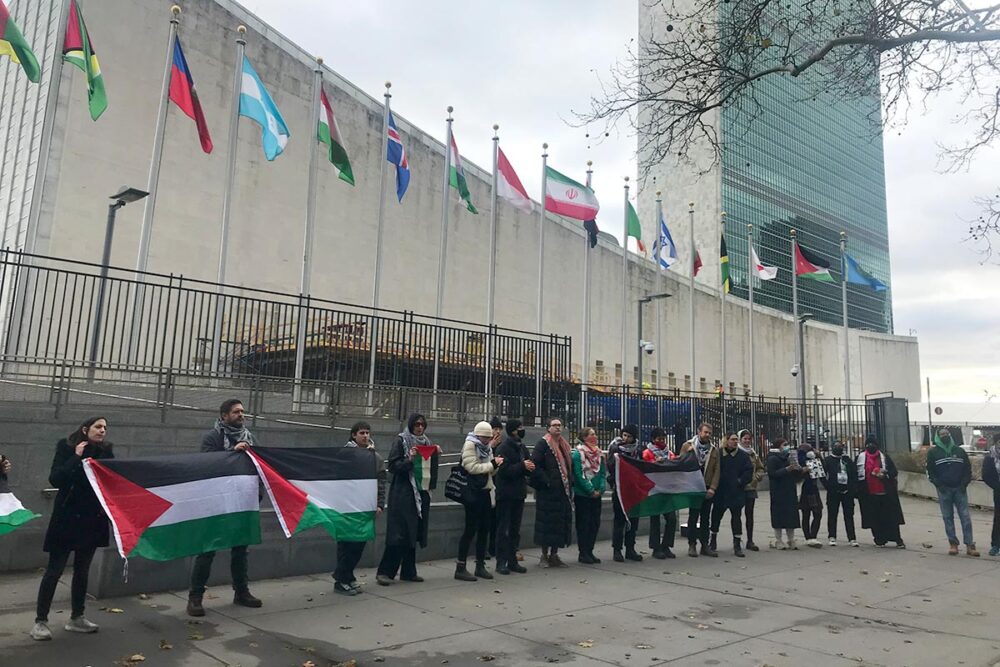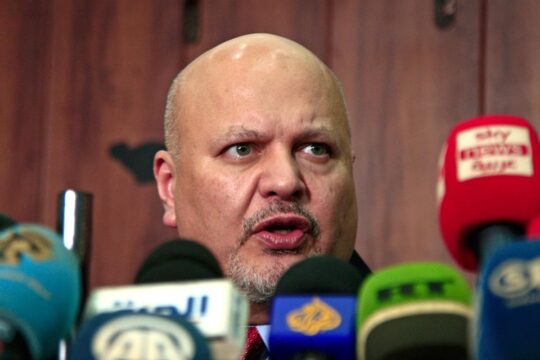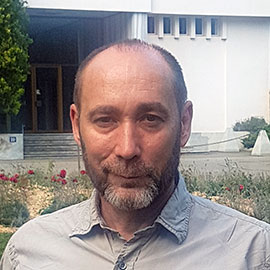Every year a dominant theme emerges from debates organised by NGOs on the sidelines of the ICC's Assembly of States Parties (ASP). This year, you might have bet on Palestine but you would have lost: of the 40 or so panel discussions announced, not one had it on the programme. The October 7 Hamas attack on Israel and the Israeli army’s destruction of Gaza came too late in the run-up to the Assembly, which was held from December 4 to 14 at the United Nations headquarters in New York. You might have bet on Ukraine, where multiple war crimes continue to be committed and where the ICC prosecutor's office has its largest representation outside its headquarters in The Hague. But this conflict that occupied everyone's minds a year ago is no longer the obsession of the moment, despite the arrest warrant issued in March for Russian President Vladimir Putin.
Ecocide and threats to the environment were in vogue back in 2019, before the two years when Covid-19 anaesthetised the assembly. The plan for a special tribunal to investigate Russia’s crime of aggression against Ukraine took centre stage in 2022, but it has lost momentum. The wind no longer seems to be blowing in the right direction.
The discussions are "complicated, technical and have not led to a consensus," admits diplomat Christian Wenaweser of Liechtenstein, a former ASP president from 2008 to 2011 who has been working on the crime of aggression at UN level for 20 years. He points out that "the problem is not legal, it's political will". How many States would fail to back a UN General Assembly vote for the creation of such a tribunal targeting the most senior Russian leaders? We don't know, he confided at the end of a debate organised on the assembly sidelines. A resolution has been drafted, but it has never been submitted, because Ukraine fears it will fail. Wenaweser wants to believe that circumstances can change and the project can bounce back. But it is clear to him that only a tribunal created at UN level would have sufficient legitimacy (not to mention the obstacle, raised by others, of diplomatic immunities). There is no "plan B", such as a tribunal established under the aegis of the Council of Europe. In the meantime, Ukraine could at least decide to join the ICC as a State Party. "The political message would be enormous for us," says Wenaweser, turning to a Ukrainian representative.
Double standards
It is once again the "small" states that are promoting application of the law, as they did when the ICC was created in 1998. "For us, respect for international law is our bread and butter. It's a matter of self-interest and survival," says Wenaweser. But this is not a time of peace between the big powers. "We are witnessing [a context] where states think that the use of force is a way to address problems," says the diplomat. It is the small countries that are pushing the legal agenda, but it is the big countries that are deciding, according to their interests.
In the shadow of the debate on the crime of aggression is the question of double standards, of which international justice has long been accused, and which has come to the fore again since the wars in Ukraine and Gaza. If Russia is to be judged for its aggression in Ukraine, why was this not done for the US invasion of Iraq in 2003? Why is there so much Western support for justice in Ukraine and so little in Palestine? The West is everywhere caught up in its past, its biases and hypocrisy.
"In the world I operate in of international justice, double standards are the main obstacle. It’s the main sticking point. International justice has always fallen flat when it comes to dealing with powerful Western interests," said Reed Brody on the Democracy Now! channel, just after ICC prosecutor Karim Khan's visit to Israel and the West Bank, and on the eve of the ICC assembly in New York.
This American human rights lawyer, a former pillar of the Human Rights Watch organisation, was the driving force behind the trial of former Chadian dictator Hissène Habré. But he would just as soon have seen Henry Kissinger or George W. Bush put on trial. “For 15 years the Palestinian complaints at the ICC have been given this slow walk by the three prosecutors,” says Brody. “Luis Moreno Ocampo spent several years evaluating whether or not Palestine was a state. Friends of the ICC put pressure on the Palestinian authorities not to ratify the ICC Treaty [of Rome, ratification of which enshrines a state's membership of the Court]. The second prosecutor Fatou Bensouda spent five years looking at whether crimes were committed and finally determined just as she was about to leave office that there was sufficient evidence to believe that crimes may have been committed, including [Israeli] illegal settlements, war crimes on both sides. This prosecutor, Karim Khan, has had this issue sitting on his desk for two years. He had one person in his office investigating that case.” And Brody adds: “Israeli settlements are war crimes. This is not something you even need to go on the ground to investigate.”
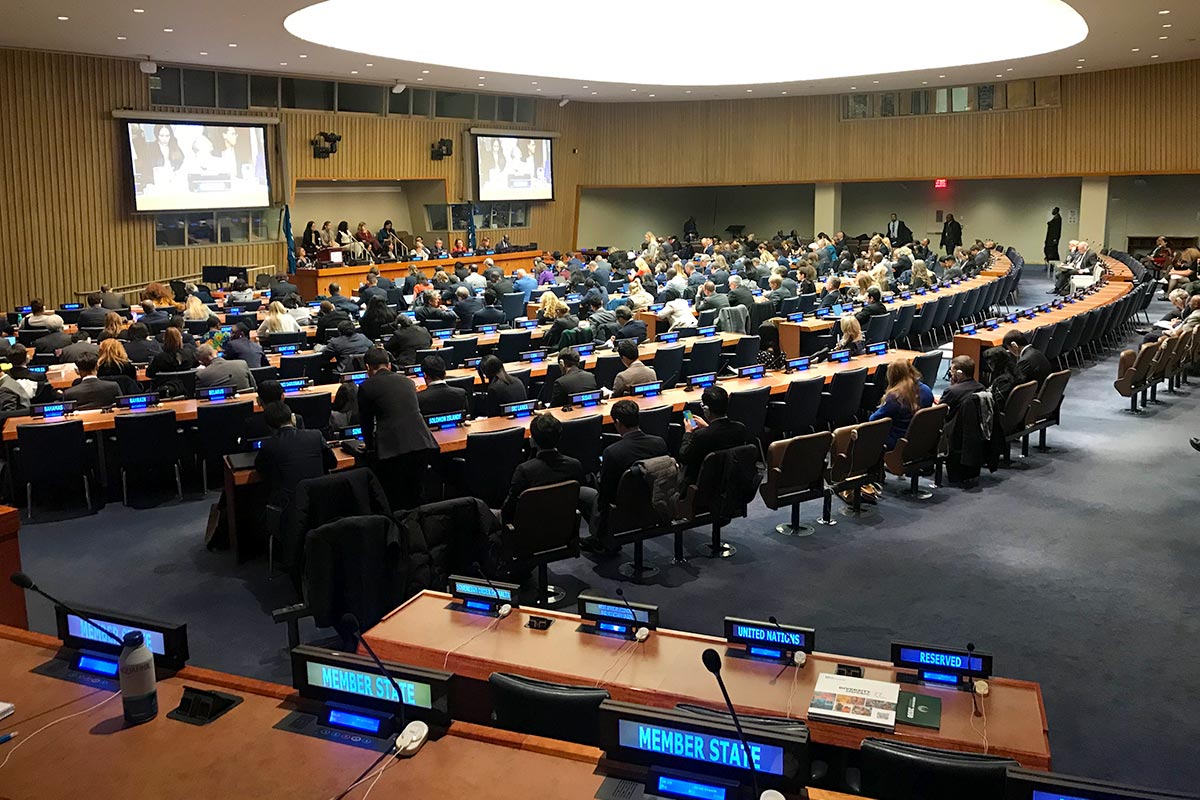
Palestine, the mirror of hypocrisy
The sidelines of an ICC plenary session are a kind of hushed, polite international justice fair. This is a huge gathering where NGOs promote their actions and push their agendas with member states and the prosecutor's office. Inevitably, there is a form of competition between victims, through direct representatives or activists. But the only Israelis we met had come for debates in the UN's political forums -- the General Assembly or Security Council --, not for the ICC (of which Israel is not a member). None of them were there to defend their positions and interests in the airless basements where NGO activity had been confined. And it was the voice of Palestine, desperate and exasperated, bruised and determined, that most often disturbed the comfort of the international justice circle in New York. Palestine was not officially on the agenda, but it was on everyone's mind and in the corridor discussions. It stuck to Khan like glue in the panels where he came to present his annual report or the new policies developed by his office. No one could ignore "the elephant in the room", as Ahmed Abofoul, a lawyer with the Palestinian organisation Al Haq, put it.
Incoherence and hypocrisy are not, however, the prerogative of the West. When a North African activist evokes the "disconnect between the ICC and the Arab population and leaders" and the challenge of “two billion Muslims who say to us what is the ICC doing in Palestine?", it is easy to retort that only two Arab states are members of the Court - Jordan and Tunisia - and that neither of them signed the referral on Palestine sent to the ICC prosecutor by five states on November 17.
Blocking by Brazil
The State that is currently blocking ICC debates the most, including on boosting the court's resources, is Brazil. The 2024 budget of 187 million euros has been increased by 10%, compared with the 16% increase requested. "Brazil's position is very disconcerting and indicative of the politicisation of the Court," says a member of a European delegation. Brazil defends the geopolitics of the "BRICS" (Brazil, Russia, India, China and South Africa), spearheading the challenge to Western domination. It abstained from voting on the ICC's report to the UN General Assembly, wants to remove all references to cooperation between the ICC and the UN Security Council, and wants guaranteed the freedom of member states to receive personalities who are the subject of an arrest warrant - such as Putin or Sudan's Al-Bashir.
In the context of this vast challenge to Western domination, is Palestine a breaking point for the ICC, as some are predicting? What place can justice have when international humanitarian law is called into question, or misused to such an extent that some experts wonder if the law of war still exists?
Sexual violence and slavery: the new frontiers
And finally, as if we needed to forget the impotence of a court with a disastrous judicial record – only five convictions against rebel commanders (all African) in more than 20 years of activity, no convincing prosecutions against state actors --, the dominant theme this year was sexual violence. Twenty-five years after the Jean-Paul Akayesu judgement, which recognised rape as a constituent part of the genocide of Tutsis in Rwanda, and after numerous judgements handed down by international courts, one might well ask why this mobilisation around sexual crimes: no one questions rape as a war crime or as a crime against humanity any more.
But for legal campaigners, it is time for a much more sophisticated debate on the issue. What is needed now is recognition of the variety of crimes based on gender discrimination. "Almost every crime in the Rome Statute [the ICC’s founding treaty] can be gendered," explains Kim Thuy Seelinger, adviser to the prosecutor on gender violence. In short, the understanding of this violence is following a similar trend to that which marked feminism. It must now be understood as going far beyond crimes of a strictly sexual nature, including forms of "apartheid" against women as in Afghanistan and Iran. And they also affect men - present among the invited victims - and LGBTQ people.
This effort toward greater depth also came up in the debate on "decolonising" international law. Patricia Viseur-Sellers, the prosecutor's adviser on crimes of slavery, thinks the Rome Statute should be amended so that this contemporary reality is better understood in the context of war crimes and crimes against humanity. Child soldiers, “bush wives”, migrants, Yezidis... the slave trade is a contemporary reality. There is also a "link between race, slavery, colonialism and climate change", argues Priya Morley, a professor at the University of California Law School. Indigenous peoples are particularly affected. "The global ecological crisis is a global racial injustice,” she says.
Confusion around complementarity
In practice, the ICC is lagging behind developments in international law and the new challenges of large-scale violence, particularly outside conflict. The presence of a large number of Colombian justice officials was illuminating in terms of the ICC’s lack of creativity. It is in Bogotá and not in The Hague that courts are affirming the cultural and spiritual dimension of destroying indigenous communities, describing as war crimes the destruction of territory, the natural environment, oil contamination and cultural heritage.
The ICC, like all post-Cold War international courts, has an irrepressible tendency to see its relationship with national courts as that of an institution that has everything to teach and nothing to learn. Cooperation with national courts, and the principle of complementarity between them and the ICC, were the subject of several debates in New York. This complementarity, theoretically governed by the rules of the Court, has never been applied rigorously or consistently. And the impression given by the round tables is that this general confusion, which everyone prefers to keep quiet, satisfies everyone.
The ICC's main purpose is to stimulate action by national courts. "We are very present, even if we are not always visible," says Mame Mandiaye Niang, one of the two deputy prosecutors. But it's hard not to detect in this discourse a way of masking a meagre judicial record and the fact that the Court has made no headway in major contemporary fields of mass violence like environmental crimes, the responsibility of multinationals, human trafficking, land theft, and so on. And while a member of the prosecutor’s office boasts of its fruitful relationship with the hybrid Special Criminal Court (SCC) in the Central African Republic, head of the UN support unit for the SCC Magali Maystre asks: "Is the Office of the Prosecutor ready to learn from us, to have a two-way cooperation?”
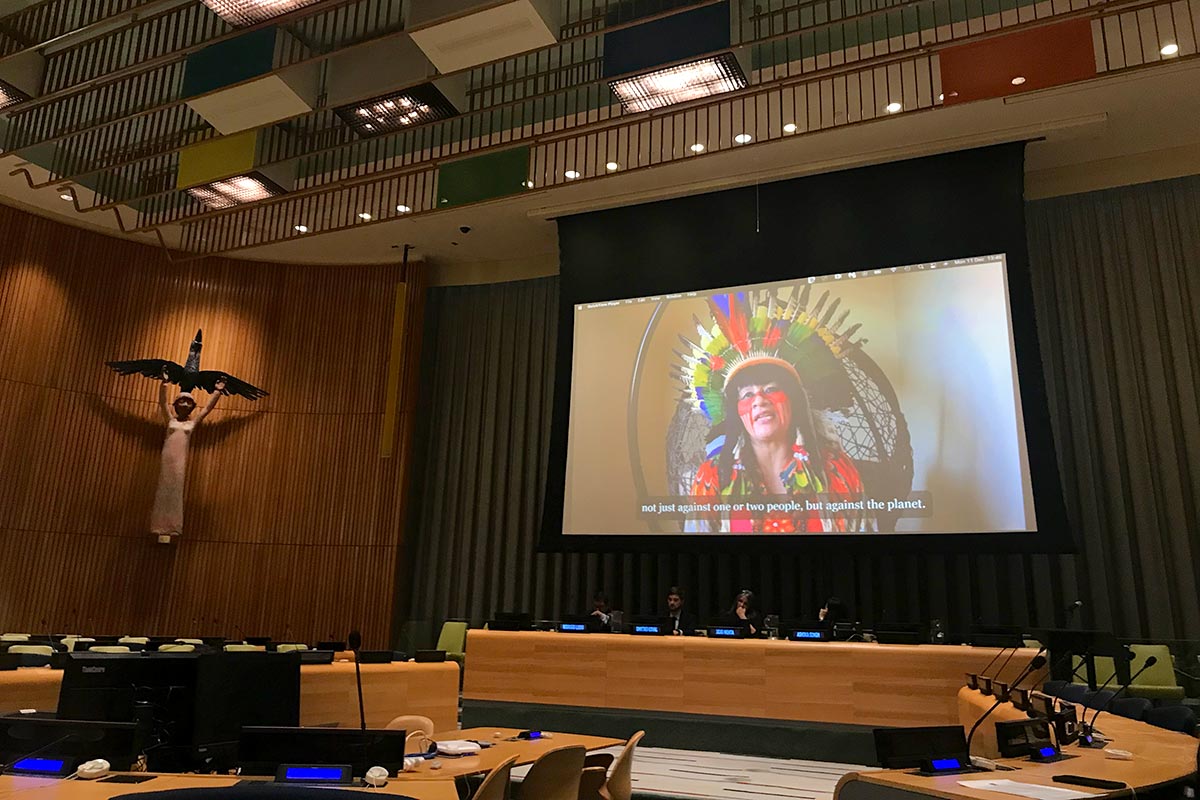
A unique sounding board
Despite all these issues, the ICC remains a unique sounding board used by activists all over the world to ensure that the resonance of their actions does not stay trapped in the Burmese monsoon, the sands of the Middle East or the mountains of the Andes. This is the great paradox. While the Court is a judicial and political dwarf, it is the symbolic and idealised refuge of the law in the face of the world's upheavals. None of the powerful fear it, but almost everyone seems to want to seize it or influence its decisions. "As much as it might seem a diminished idea, we need international humanitarian law. We need a certain amount of it,” confides a legal expert who worked on the emergence of international criminal justice in the 1990s.
Ecocide only came up in the second week, when many NGOs had left. In the huge room of the UN Trusteeship Council Chambers, there were just over 20 people. Once again, the future of international law is being played out elsewhere, at national or regional level. But it is here that the strongest voice is heard. Valdelice Veron, spokeswoman for the Guarani-Kaiowá people in the Brazilian state of Mato Grosso do Sul, is speaking on video from COP28, which is drawing to a close in Dubai. On the giant screen, she appears in her traditional clothes and headdress, her face painted. "Who is behind this destruction?" she asks, with rage in her heart. In her voice, ecocide is no longer the cold object of an uncertain legal definition. It is no longer just the destruction of nature by multinationals and human greed, "in the name of progress". It sounds like the cry of the human race in revolt and distress against its own darker side which is a threat, from Campo Grande to Zaporijia, from Ürümqi to Cox's Bazar and Al-Fasher.


